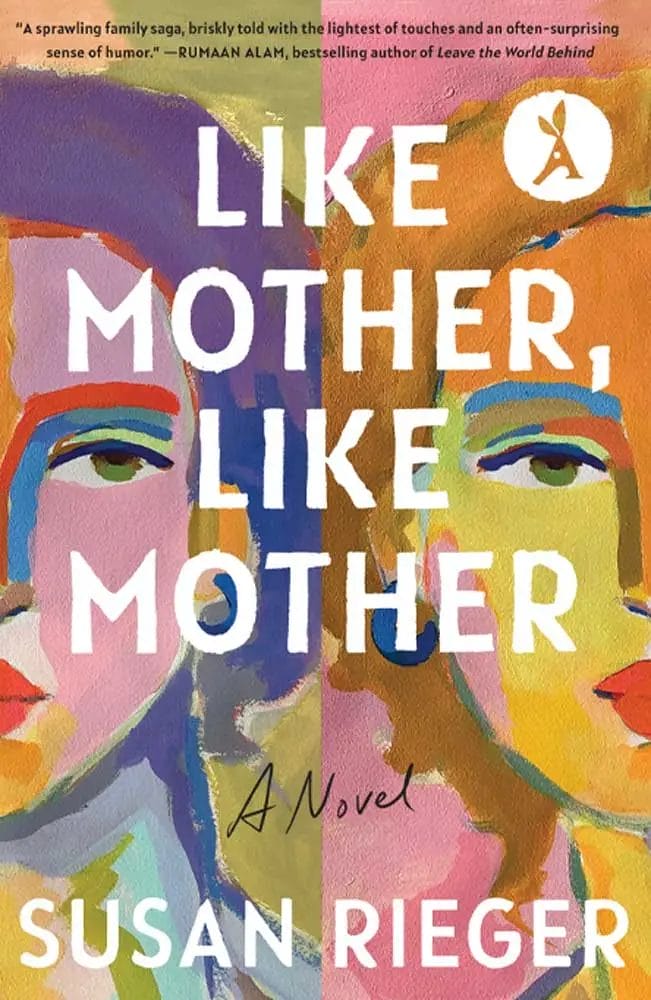

Like Mother, Like Mother
By Susan Rieger
An enthralling novel about three generations of strong-willed women, unknowingly shaped by the secrets buried in their family’s past.
Detroit, 1960. Lila Pereira is two years old when her angry, abusive father has her mother committed to an asylum. Lila never sees her mother again. Three decades later, having mustered everything she has—brains, charm, talent, blond hair—Lila rises to the pinnacle of American media as the powerful, brilliant executive editor of The Washington Globe. Lila unapologetically prioritizes her career, leaving the rearing of her daughters to her generous husband, Joe. He doesn’t mind—until he does.
But Grace, their youngest daughter, feels abandoned. She wishes her mother would attend PTA meetings, not White House correspondents’ dinners. As she grows up, she cannot shake her resentment. She wants out from under Lila’s shadow, yet the more she resists, the more Lila seems to shape her life. Grace becomes a successful reporter, even publishing a bestselling book about her mother. In the process of writing it, she realizes how little she knows about her own family. Did Lila’s mother, Grace’s grandmother, die in that asylum? Is refusal to look back the only way to create a future? How can you ever be yourself, Grace wonders, if you don’t know where you came from?
Spanning generations, and populated by complex, unforgettable characters, Like Mother, Like Mother is an exhilarating, portrait of family, marriage, ambition, power, the stories we inherit, and the lies we tell to become the people we believe we’re meant to be.
My thoughts:
As soon as I read the synopsis for this book, I knew I needed to read it. It sounded like the type of family drama that I typically enjoy. While I liked it for the most part, I feel like there was a real missed opportunity that would have elevated this from a good story to an amazing one.
In this book, the author weaves together the stories of three generations of women – Lila, a powerhouse in the journalism industry; her daughter Grace, who grew up feeling distant and isolated from her mother; and finally, Zelda, Lila’s mother, who was committed to an asylum when Lila was a child.
The novel opens in Detroit in 1960, where we meet Lila Pereira, a young girl whose life is turned upside down when her mother is committed to an asylum by her abusive husband. Once their mother is gone, the father turns his aggression toward his daughters, prompting Lila to leave as soon as she can. She turns her trauma into determination, finding her way to a career in journalism, where she quickly becomes a force to be reckoned with in the industry, so much so that it causes her to invest more time in her job than in her family.
Her daughter Grace, in particular, feels the weight of Lila’s absence and strives to forge her own path while grappling with the legacy of her family’s past. Even though the career Lila chose had a negative impact on her family, Grace eventually finds herself following the same career path, and it’s during this time that she sets out to find out what exactly happened to Lila’s mother, Zelda. Did she really die in the asylum, like Lila’s father said, or was that just a story made up by a fragile, egotistical man? The more Grace learns about her past, the more she begins to understand her mother and her life choices.
Rieger does a great job delving into themes of motherhood, ambition, and the complexities of familial relationships. It’s an interesting look at how family history and shared traumas shape the trajectory of lives for generations. I loved the thought behind it and found many of the characters intriguing. I was especially drawn to Lila. She is the story’s anchor and the most complex character of the bunch. Her story and scenes with her were electric. Grace is on the further end of the spectrum, picking up the pieces of the legacy that began with her abusive grandfather and the grandmother she never knew. While I liked her character, I didn’t feel emotionally invested in her.
The one character that I felt far too distant from was Zelda. It’s with her that this heartwrenching journey begins. The abuse she suffered at the hands of her husband and her eventual commitment to the asylum was the catalyst that kicked all of this off, but I felt like we only scratched the surface of her story. The author structured the book to focus on Lila first, then Grace, and then Zelda, but Zelda’s section was very light on giving much insight into who Zelda was before her marriage. We get answers, but they are very surface-level. This was a real missed opportunity on the author’s part and had we gotten a deeper dive into her character, it would have really elevated the story.
I found this novel to be quite interesting, and I particularly loved Lila’s character. On the surface, the book celebrates the strength of women and explores the impact of past traumas on both individuals and future generations. However, I wished I had felt a stronger connection to some of the other women in the story, and I would have appreciated a deeper insight into their experiences. Overall, I liked this one, but I didn’t love it.
Book Club/Book Box:













